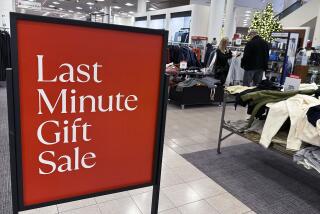FASHION : Invitation-Only Sales Cater to ‘Best’ Buyers
- Share via
Those engraved invitations that start arriving in mailboxes about this time of year aren’t necessarily a reflection of one’s personal charisma and popularity.
Many of them are dispatched by upscale stores, inviting only their best customers to shop at the private sales that begin in December.
And “private” is the right word. By the time the uninvited--those customers on the stores’ general mailing list--receive notice of the mark-downs, many sale racks have been all but stripped bare of the best buys. The preferred clients, the big spenders and longtime loyalists, got there first.
A number of retailers defend the system, explaining that invitation-only sales reward their most faithful customers by allowing them to choose from discounted merchandise before it is offered to the general public.
To these select shoppers--who are chosen according to their avowed loyalty, or how much they spend in the store per year, or how well they know one of the salespeople--notices go out long before the private-sale date. And when the day of the sale arrives, the most exclusive stores lock their doors and station a guard out front to keep away the uninvited.
Some retailers worry that such exclusivity creates ill will among patrons. At least one customer agrees. “I remember going to the door and being told, ‘You can’t come in,’ ” says an occasional shopper at Lina Lee in Beverly Hills. “It was the most shocking thing.” She continues to shop there, she says, but she didn’t appreciate being turned away.
Indeed, to some customers and merchants, an exclusive sale is not as big as it sounds. After all, merchandise isn’t marked down until a season is over, and retailers are usually happy to get rid of it.
But the private sales operated by Maxfield in West Hollywood and Lina Lee in Beverly Hills seem to have a mystique all their own. On designated sale days, when both stores are closed to the public, even customers with money to spend are not welcome unless they’ve been invited and have responded by making an appointment.
At Maxfield, invited customers say they are even discouraged from bringing a friend along. “I think it’s terrific in many ways,” says Judie Stein, vice president of McDermott Entertainment Group and a longtime Maxfield customer. “I do have a certain loyalty to Maxfield, and this is their way to show their appreciation.”
“We lock the door, serve lunch and it’s kind of like a party,” says Lina Lee Lidow, owner of Lina Lee on Rodeo Drive, whose private sale took place at the beginning of this month. Lidow says invitations are based not so much on how much a customer has spent through the year, but on loyalty. “You don’t have to spend $100,000 a year,” Lidow maintains, adding that if a customer requests an invitation, she is accommodated.
Maxfield’s Tommy Perse, whose private sales have been a semiannual event for at least 10 years, declined to comment.
“Why else would people develop loyalties to a special store if they don’t have advantages?” asks Elaine Kim, co-owner of Ecru in West Hollywood, which also has initiated by-appointment-only sale days.
At some stores, even the private, invitation-only sales aren’t the most exclusive. The first sale takes place before the date on the private-sale invitation. This is discreetly done and few retailers will admit to it. Yet even some of the largest specialty stores, usually perceived as egalitarian, do it. Customers who deal regularly with only one salesperson in some departments at I. Magnin, Bullocks Wilshire and Neiman Marcus receive a phone call from that salesperson inviting them to “pre-select” sale merchandise about a week before it is marked down. The transaction isn’t rung up until the private-sale day officially begins.
John Martens, vice president and general manager of Neiman Marcus in Beverly Hills, says: “To be honest, we don’t like to have a pre-sale of a pre-sale.” But, he continues, “possibly the day before” a private sale begins, salespeople do, indeed, call good customers.
Shauna Stein, proprietor of the boutique of the same name in the Beverly Center, says that most of her private-sale customers spend at least $3,000 per season. “It’s our thank you to the people who frequent the store,” Stein says. “I have customers who have been shopping with me for, literally, 13 years--three years in this store and 10 years when I was standing on the floor at Ron Ross. They’re almost like extended family.”
But retailer Charles Gallay, who owns the Gallay shop in West Hollywood and the Azzedine Alaia store in Beverly Hills, disapproves of them. He sees private sales as “discriminatory” and adds: “I just don’t believe in them anymore. I don’t want to say to women, ‘We’ll leave you the leftovers of our affluent customers.’ ”
He did hold private sales in his former Beverly Hills store, the Charles Gallay boutique, which was open from 1975 to 1985.
Now, he feels, “there are many beautiful, wonderful, fashionable people who can’t afford our clothes at regular price and who wait for our sales. If someone can’t afford an Alaia jacket that costs $700 to $1,100 at regular price, she may never get to know how wonderful Alaia jackets are. And one day, the girls who can’t afford to be our regular customers will be, once they become successful. That will be the payoff.”
Jerry Magnin, owner of the Polo shop on Rodeo Drive, believes private sales “create more ill will than good,” he says, adding that “people who don’t buy at regular price are an important customer to us.” Although mailing list customers are notified of sales at Polo before the time the sales are advertised, anyone can get on the mailing list by filling out a card.
Likewise, Beverly Hills retailer Fred Hayman says he never ran a private sale when his store was operated under the Giorgio banner and hasn’t since the store was renamed Fred Hayman.
Asked if anyone could come to shop at his two annual clearance sales--in January and July--Hayman replied: “I wish they would, so I could get rid of the merchandise. That’s what a sale is for.
“Sales are nothing to be proud of,” Hayman emphasizes. “You don’t make any money on them, and by the time I put clothes on sale, the season is over. I hate them.”
More to Read
Sign up for The Wild
We’ll help you find the best places to hike, bike and run, as well as the perfect silent spots for meditation and yoga.
You may occasionally receive promotional content from the Los Angeles Times.






